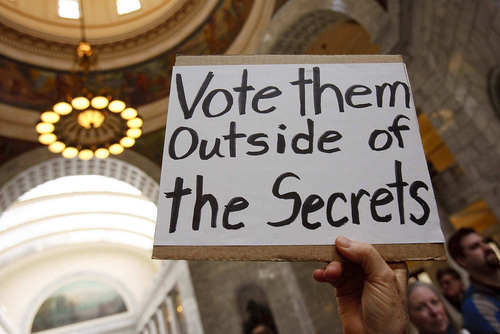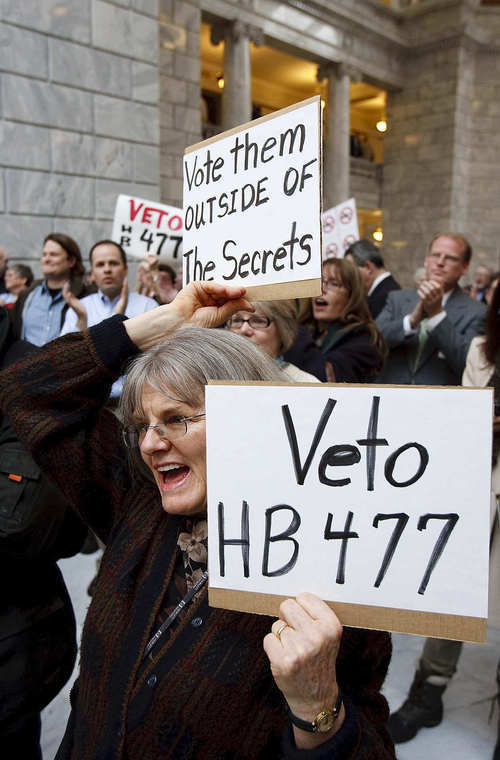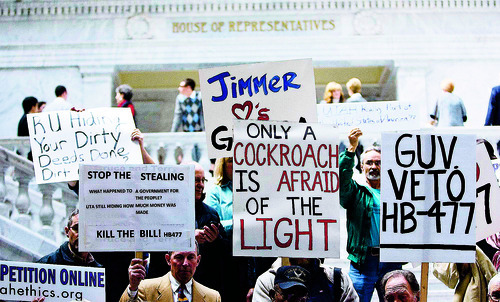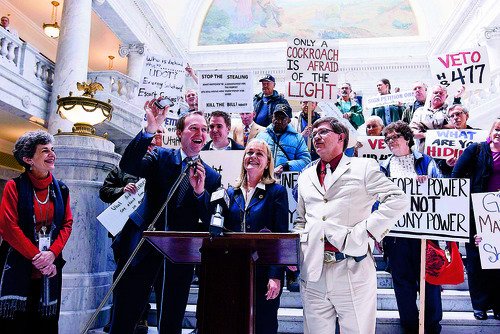This is an archived article that was published on sltrib.com in 2011, and information in the article may be outdated. It is provided only for personal research purposes and may not be reprinted.
About 200 people rallied at the state Capitol midday Tuesday to demand the governor veto HB477, a bill that shields more government records from public disclosure. But Gov. Gary Herbert wasn't swayed.
He announced after 8 p.m. that he had signed the bill into law, saying that with its delayed effective date, there will be plenty of time for a healthy public discussion about how best to ensure the public's right to know what its government is up to without violating privacy rights.
"This bill provides a way to find the right balance between the public's right to know and the personal privacy of both constituents and policymakers, while protecting taxpayer dollars," Herbert said in a prepared statement. "Our goal is open and transparent government."
"With HB477 now amended [to take effect July 1], the delayed implementation date allows us to have an open public process with robust, deliberate engagement by the public, the media and lawmakers."
The governor's news release came just a few hours after about 200 people held a demonstration in the Capitol. Almost all the speakers were from good-government groups — not the news media.
They chanted, "Veto! Veto!" and held signs reading, "Only a cockroach is afraid of light," "Sunshine, not secrecy" and "Hiding something?"
Kim Burningham, chairman of Utahns for Ethical Government, said that the Legislature's action in recalling the bill Monday to extend its effective date to July 1doesn't fix the measure.
Lawmakers have said the extension will provide time to negotiate any needed fixes that then could be passed in a special legislative session in June.
"We do not need a pacifier on HB477. We need a veto," said Burningham, a former legislator, to cheers. "This bill is a severe restriction on the public's right to know and reduces the concept of freedom of information to a mere shell of its former self."
Lawmakers kept the bill's text secret until last week, when they quickly moved it to a committee hearing and to overwhelming votes of approval in the House and Senate. They recalled it Monday, saying a delayed implementation date was the only change needed to make it good legislation.
Claire Geddes, who, for years, has been a watchdog at the Legislature, said if lawmakers "really wanted to negotiate" effective changes, "they would have negotiated before they passed the bill." She said if the bill wasn't vetoed, she doubts any real changes would come.
Jordan River activist Jeff Salt, a frequent user of the Government Records Access and Management Act (GRAMA), said, "Bad government needs secrecy to survive. ... This is a blatant attempt to keep government secret."
Sherilyn Bennion, co-legislative director for the Utah League of Women Voters, said HB477 "has been characterized as a bill that threatens media access. However, this bill threatens access for every citizen of Utah for records that we need."
Several legislators who opposed the bill also addressed the rally.
Rep. Joel Briscoe, D-Salt Lake City, held up his BlackBerry phone, on which he receives e-mails and texts, that would be barred from release under the bill.
"You guys are paying for this," he said. "There's nothing that interesting on it, but you are free to read it."
Rep. Patrice Arent, D-Millcreek, added that "the public's business should be done in public."
HB477 would prohibit the disclosure of text messages and instant messages; allow government agencies to charge fees for information that can include administrative and overhead costs; and require those wanting records protected by the government to show — with a preponderance of evidence — that the information should be released.
Herbert said in his statement that a working group will convene to discuss the issues surrounding GRAMA and that he is committed to call a special session in June to address "further revisions."









